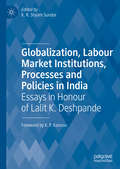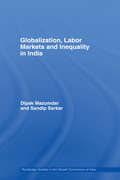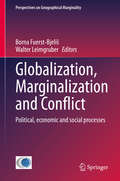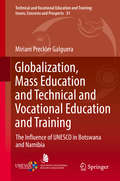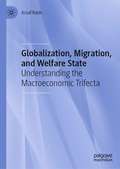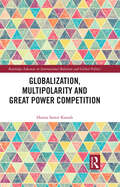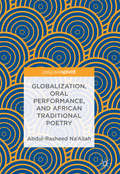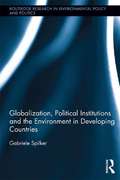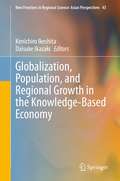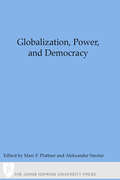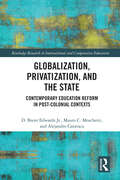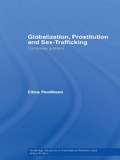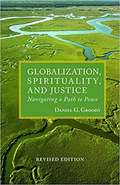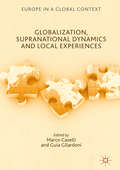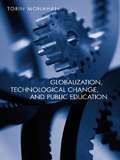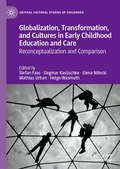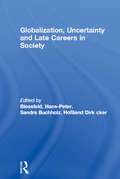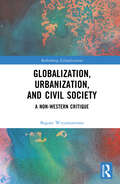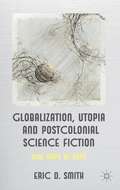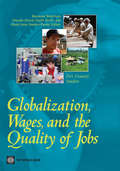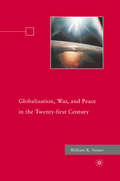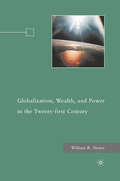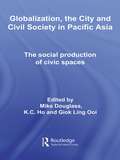- Table View
- List View
Globalization, Labour Market Institutions, Processes and Policies in India: Essays in Honour of Lalit K. Deshpande
by K.R. Shyam SundarThis book explores the effects of product market and labour market reforms on firms, labour institutions and labour rights in the economic and industrial relations system in India. India has over the years liberalized its economy through a broad range of reforms concerning the product market and complementing these it has also sought to reform the labour market and the industrial relations system. The book assesses the impact of these reforms on both the formal and informal labour markets in India, critically examines the labour processes and uncovers/describes precarious conditions of labour in various industries and occupations, and analyzes the dynamics involved in the making of industrial, employment and labour policies in contemporary India.
Globalization, Labour Markets and Inequality in India (Routledge Studies In The Growth Economies Of Asia Ser.)
by Dipak Mazumdar Sandip SarkarIndia started on a program of reforms, both in its external and internal aspects, sometime in the mid-eighties and going on into the nineties. While the increased exposure to world markets (‘globalization’) and relaxation of domestic controls has undoubtedly given a spurt to the GDP growth rate, its impact on poverty, inequality and employment have been controversial. This book examines in detail these aspects of post-reform India and discerns the changes and trends which these new developments have created. Providing an original analysis of unit-level data available from the quinquennial National Sample Surveys, the Annual Surveys of Industries and other basic data sources, the authors analyse and compare the results with other pieces of work in the literature. As well as describing the overall situation for India, the book highlights regional differences, and looks at the major industrial sectors such as agriculture, manufacturing and tertiary services. The important topic of labor market institutions - both for the formal or organized and the unorganized sectors - is considered and the possible adverse effect on employment growth of the regulatory labor framework is examined carefully. Since any reform of this framework must go hand in hand with better state intervention in the informal sector to have any chance of acceptance politically, some of the major initiatives in this area are critically explored. Overall, this book will be of great interest to development economists, labour economists and specialists in South Asian Studies.
Globalization, Marginalization and Conflict: Political, economic and social processes (Perspectives on Geographical Marginality #6)
by Walter Leimgruber Borna Fuerst-BjelišThis book looks at marginality from a less conventional perspective by analyzing complex social, cultural, political and economic relations between the aspects of globalization and various forms of marginalization. It focuses specifically on the conflict potential that results from the globalization-driven inequality and marginalization of many segments of societies. This view is further illustrated in sections on border regions, identity issues, minorities and poverty. The book gives a comprehensive but in-depth analysis of the various aspects of the relations between globalization, marginalization and conflict issues, based on a number of case studies and regions worldwide. It shows how the same issues of globalization and marginalization manifest themselves in different ways under different circumstance, obviously requiring different solutions. Based on original research, this book provides new insights on the globalization-marginalization relations and a good resource to academics, scientists and students in various fields of social, political science and humanities.
Globalization, Mass Education and Technical and Vocational Education and Training: The Influence of UNESCO in Botswana and Namibia (Technical and Vocational Education and Training: Issues, Concerns and Prospects #31)
by Miriam Preckler GalgueraThis book assesses the influence of the international organization UNESCO on the development of national Technical and Vocational Education and Training (TVET) systems in the Southern African Community Region (SADC), focusing particularly on Botswana and Namibia. Designed around UNESCO’s Better Education for Africa’s Rise (BEAR) project, the study is an excellent example of applied policy research.Analysis is from the perspective of key stakeholders including UNESCO headquarters and field offices, Ministries of Education and of Labor, employers and employees, education and training institutions, international partners and more. Both qualitative and quantitative evidence are used to provide a comparative overview, and the author also reveals the current state of data on skills.Readers will discover common goals and challenges across the nations but also a common lack of action to measure the impact and influence that UNESCO’s programs have had at a national level, prior to this study. Were the newly implemented educational policies successful or not? If the public policies failed, why was that? These chapters shed light on such questions and how UNESCO's contribution influenced the national development processes, in the context of globalization processes and trends of global mass education.The book has much to offer for both scholars and those working in UN agencies or national governments who seek to develop education systems and better link them to the world of work.
Globalization, Migration, and Welfare State: Understanding the Macroeconomic Trifecta
by Assaf RazinThis book is about three key dimensions in economics—globalization, migration and the welfare state—that are of enduring interest. These issues are particularly important to consider at the present moment given the strains posed by the pandemic: there is at least a temporary setback to trade-globalization and migration, and the cost of fighting the pandemic will strain the ability of governments to provide welfare state services in a style and scope to which many of their citizens have become accustomed. The book explains the changing function of the welfare state in the presence of intensified globalization, or de-globalization, forces. The welfare state’s policy-maker attitudes toward openness and migration depend on open-economy fundamentals, and the income class it represents. The author demonstrates the interactions between migration, globalization and macroeconomic policy in practice, using real-world unique episodes, with Israel deemed as well-functioning trifecta, and the US and Europe as imperfectly functioning trifecta.
Globalization, Multipolarity and Great Power Competition (Routledge Advances in International Relations and Global Politics)
by Hanna Samir KassabIn his new book, Hanna Samir Kassab examines changes and trends in international politics and the competition between great powers for control of the international system. He argues that the increase in geopolitical, economic, nationalist, and resource competition between three great powers, the United States, China, and Russia, points to the changing structure of the international system. This competition is a systemic one, focusing more on the rules and norms that defined the system since the end of the Cold War. This American-led unipolar order is translating into a multipolar one. Kassab begins by tracing the decline of the United States after the Iraq War (2003) and the Great Recession (2008) as well as the rise of China and the resurgence of Russia. He describes major foreign policy changes from George H.W. Bush to Donald J. Trump and how the various administrations approached the international system. This explains that while the United States pulls-back from the international system, China and Russia are seeking to increase their influence. Written using simple jargon and defines terms whenever necessary, Globalization, Multipolarity and Great Power Competition is equally accessible to academics and casual readers and lay-people interested in international politics.
Globalization, Oral Performance, and African Traditional Poetry
by Abdul-Rasheed Na’AllahThis book discusses globalization trends and influences on traditional African oral literary performance and the direction that Ilorin oral art is forced to take by the changes of the twenty-first century electronic age. It seeks a new definition of contemporary African bourgeois in terms of its global reach, imitation of foreign forms and collaboration with the owners of the primary agencies. Additionally, it makes a case that African global lords or new bourgeoisie who are largely products of the new global capital and multinational corporations’ socio-political and cultural influences fashion their tastes after western cultures as portrayed in the digital realm.
Globalization, Police Reform and Development
by Graham Ellison Nathan W. PinoThis volume presents a unique examination of Western-led police reform efforts by theoretically linking neoliberal globalization, police reform and development. The authors present seven country case studies based on this theoretical and conceptual approach and assess the prospects for successful police reform in a global context.
Globalization, Political Institutions and the Environment in Developing Countries (Routledge Research in Environmental Policy and Politics)
by Gabriele SpilkerThough industrialized countries are usually the ones indicted when environmental pollution is discussed, over the few last years the rate of emissions in developing countries has increased by a startling amount. The fallout from this increase is evidenced by the struggle of cities like Beijing to improve their air quality. Yet there also exist developing countries such as Thailand that have managed to limit their emissions to more tolerable levels, raising the question: why are some developing countries more willing or able to take care of their environment than others? In this volume, Gabriele Spilker proposes two factors for the differences in developing countries’ environmental performance: integration into the international system and domestic political institutions. Focusing on developing countries generally but also closely examining important global powers such as China and India, Spilker employs a rigorous quantitative analysis to demonstrate the importance of considering various aspects of the international system, in order to draw more comprehensive conclusions about how globalization affects environmental performance. She asserts that democratic political institutions can shield developing countries from the negative consequences of either trade or foreign direct investment. But at the same time, developing countries, by avoiding demanding commitments, are more likely to use environmental treaties as a cover than as a real plan of action. Adding a new dimension to the existing body of research on environmental quality and commitment, Spilker convincingly demonstrates how international and domestic political factors interact to shape developing countries’ ability and willingness to care for their natural environment.
Globalization, Population, and Regional Growth in the Knowledge-Based Economy (New Frontiers in Regional Science: Asian Perspectives #43)
by Kenichiro Ikeshita Daisuke IkazakiThis book clarifies how globalization, progress in the knowledge-based economy, and demographic change affect regional economic growth, using the latest analytical methods for economic growth. In the last 30 years, Asian countries have realized remarkable economic growth and are expected to become major growth centers of the world economy in the future. On the other hand, many researchers and policy makers point out that the Asian economy will face numerous challenges to sustain its growth. Specifically, globalization, realization of the knowledge-based economy, and population decline will bring about major changes in the structure of the Asian economy. This book provides the reader with the analytical framework to investigate how these structural changes affect regional economic growth. Moreover, the book covers topics such as foreign direct investment, quality of institutions, intergenerational conflict, education policies, and household fertility decision, all of which are comprehensively explained from the point of view of economic growth. Therefore, the scope of this volume is not only contemporary but also important for going beyond the usual regional economics and growth literature. This work is highly recommended to academic researchers and students who are interested in various aspects of regional economic growth.
Globalization, Power, and Democracy (A Journal of Democracy Book)
by Marc F. Plattner and Aleksander SmolarThough the year 2000 marks the turn of the century and of the millennium, the great turn in the realm of international politics occurred a decade earlier, with the Revolutions of 1989-91. The breakup of the Soviet Union's external empire in Eastern Europe, soon followed by the demise of the USSR itself, destroyed the bipolar structure that had characterized world politics for almost half a century. But while the dramatic collapse of communism left no room for doubt that the era of the Cold War had come to an end, there was very little agreement about the nature of the new international order being born. This book explores the emerging post-Cold War international system and its implications for the future expansion and consolidation of democracy. Bringing together both experts on international relations and scholars of democracy from Europe, North America, and Asia, it examines the link between these two subjects in a way that is rarely done. While a large literature has emerged in recent years on the effects of democracy on international relations (the debate over what is often called the theory of "democratic peace"), the authors of the present volume instead examine the other side of this relationship—the impact of the international system on the prospects for democracy.Contributors: Zbigniew Brzezinski, Center for Strategic and International Studies • Robert Cooper, Defence and Overseas Secretariat in the Cabinet Office, London • Jean-Marie Guéhenno, Institut des Hautes Etudes de Défense Nationale, Paris • Samuel P. Huntington, Harvard University • Robert Kagan, Carnegie Endowment for International Peace • Ethan B. Kapstein, University of Minnesota • Kyung Won Kim, Institute of Social Sciences • Jacques Rupnik, Fondation Nationale des Sciences Politiques, Paris • Dimitri Landa, University of Minnesota • Adam Daniel Rotfeld, Stockholm International Peace Research Institute, Stockholm • Philippe C. Schmitter, European University Institute, Florence
Globalization, Power, and Democracy (A Journal of Democracy)
by Marc F. Plattner and Aleksander SmolarEssays exploring a world dramatically transformed by the collapse of communism—and the prospects for democracy in that realigned reality.The breakup of the Soviet Union’s external empire in Eastern Europe, soon followed by the demise of the USSR itself, destroyed the bipolar structure that had characterized world politics for almost half a century. But while the dramatic collapse of communism left no room for doubt that the era of the Cold War had come to an end, there was very little agreement about the nature of the new international order being born.This book explores the emerging post-Cold War international system and its implications for the future expansion and consolidation of democracy. Bringing together both experts on international relations and scholars of democracy from Europe, North America, and Asia, it examines the link between these two subjects in a way that is rarely done. While a large literature has emerged in recent years on the effects of democracy on international relations (the debate over what is often called the theory of “democratic peace”), the authors of this volume instead examine the other side of this relationship—the impact of the international system on the prospects for democracy.Contributors: Zbigniew Brzezinski, Center for Strategic and International Studies • Robert Cooper, Defence and Overseas Secretariat in the Cabinet Office, London • Jean-Marie Guéhenno, Institut des Hautes Etudes de Défense Nationale, Paris • Samuel P. Huntington, Harvard University • Robert Kagan, Carnegie Endowment for International Peace • Ethan B. Kapstein, University of Minnesota • Kyung Won Kim, Institute of Social Sciences • Jacques Rupnik, Fondation Nationale des Sciences Politiques, Paris • Dimitri Landa, University of Minnesota • Adam Daniel Rotfeld, Stockholm International Peace Research Institute, Stockholm • Philippe C. Schmitter, European University Institute, Florence
Globalization, Privatization, and the State: Contemporary Education Reform in Post-Colonial Contexts (Routledge Research in International and Comparative Education)
by D. Brent Edwards Jr. Mauro C. Moschetti Alejandro CaravacaThis text explores how the dynamics of globalization and privatization have influenced state policy and impacted education reform in Honduras. Chapters document historical trends and the evolution of Honduras as a post-colonial nation, before looking in detail at recent state interventions in policy at pre-school, elementary, and secondary level. By offering empirical analysis of the Honduran education sector, the changing role and priorities of the state, and the increasing involvement of international organizations, NGOs, and private actors in the provision of education, the text increases understanding of how state theory interacts with broader global dynamics to impact education. This text will benefit researchers, academics, and educators with a focus on international and comparative education, policy analysis, globalization, and international development.
Globalization, Prostitution and Sex Trafficking: Corporeal Politics (Routledge Advances in International Relations and Global Politics)
by Elina PenttinenGlobalization has been traditionally interpreted as a phenomenon that takes place at the macro level and is determined by states and markets. This volume takes a different approach to understanding globalization, showing how through the global sex trade, globalization is embodied and enacted by individuals. Elina Penttinen illustrates how the global sex industry feeds on complex global flows. Drawing on extensive fieldwork on the trafficking of Russian and Baltic female sex workers, she demonstrates how the embodiment and reiteration of globalization on the bodies of gendered individuals are tied to the larger processes of globalization. Appadurai’s framework of landscapes of globalization is developed into a framework of shadow sexscapes in order to show how the global sex industry feeds on complex global flows and in turn operates as a form of shadow globalization. Globalization, Prostitution and Sex Trafficking will be of interest to students and researchers of international relations, globalization and gender studies.
Globalization, Spirituality and Justice: Navigating A Path To Peace (Theology In Global Perspective)
by Daniel G. GroodyA theological reading of globalization and a global reading of theology. This book offers a rigorously critical, and yet inspiring, vision of justice as an integral part of Christian spirituality in our complex, globalized world. At the same time, Daniel Groody's analysis draws on the conviction that faith and spirituality have an integral role in the struggle to achieve a more just social order.
Globalization, Supranational Dynamics and Local Experiences (Europe in a Global Context)
by Marco Caselli Guia GilardoniThis edited collection focuses on concepts of globalization, glocalization, transnationalism and cosmopolitanism. The contributions provide evidence of how in practice, global dynamics and individual lives are interrelated. It presents theoretical reflections on how the local, the transnational and global dimensions of social life are entwined and construct the meaning of one another, and offers everyday examples of how individuals and organizations try to answer global challenges in local contexts. The book closely focuses on migration processes, as one of the main phenomena allowing a high number of people from contemporary society to directly experience supranational dynamics, either as migrants or inhabitants of the places where migrants pass through or settle down. Globalization, Supranational Dynamics and Local Experiences will be of interest to students and scholars across a range of disciplines, including sociology, migration studies and global studies.
Globalization, Technological Change, and Public Education
by Torin MonahanGlobalization, Technological Change, and Public Education documents the dramatic changes taking place in public education through the incorporation of new information technologies. These additions to the public school environment have generally been seen as enabling tools to help students and nations compete in the global marketplace. Yet a closer look at the interplay of technological change and organizational restructuring suggests the emergence of new, less promising power relations. Through detailed ethnographic research and interviews in the Los Angeles public school system, Torin Monahan reveals how, with few exceptions, these changes to the educational process are forcing both students and workers to adapt to systems that are ever more rigid and controlling.
Globalization, Transformation, and Cultures in Early Childhood Education and Care: Reconceptualization and Comparison (Critical Cultural Studies of Childhood)
by Mathias Urban Stefan Faas Dagmar Kasüschke Elena Nitecki Helge WasmuthThis edited volume provides a critical discussion of globalization and transformation, considering the cultural contexts of early childhood education systems as discourses as well as concrete phenomena and ‘lived experience.’ The book focuses on theoretical explorations and critical discourses at the level of education policy (macro), the level of institutions (meso), and the level of social interactions (micro). The chapters offer a wide range of interpretative, contextualized perspectives on early childhood education as a cultural construct.
Globalization, Uncertainty and Late Careers in Society (Routledge Advances in Sociology)
by Dirk Hofäcker Hans-Peter Blossfeld Sandra BuchholzGlobalization has been strongly shaping and transforming both national economies and individual careers in recent decades. These profound changes have had significant consequences for individual careers of men and women both during and after their employment career. This impressive new collection focuses on the effects of the globalization process on late-midlife workers and the exit from employment – a relationship that has up to now mostly been neglected in social science literature on aging and employment. The research documented within these pages poses several important questions: * Has globalization produced fundamental shifts in late-midlife workers’ labor market participation and late careers? * What transformations in old age career mobility can we observe? * How are these transformations filtered by different national institutional settings? With an impressive array of contributions, this volume will interest students and academics involved in the study of sociology, welfare and globalization.
Globalization, Urbanization, and Civil Society: A Non-Western Critique (Rethinking Globalizations)
by Bagoes WiryomartonoGlobalization, Urbanization, and Civil Society is an interdisciplinary compilation of chapters concerning civil society in the global geopolitical context. The establishment of civil society is essential for urbanism and the global community because it is the sense and essence of development concerning what humankind is, as a collective entity on the globe. This thought-provoking book covers the multidimensional aspects, issues, challenges, and consequences of geopolitics and globalization on civil society, including freedom in the public sphere, alienation, neo-fascism, social cohesion, racial inequality, political narcissism, political-economic exceptionalism, Islamic radicalism, social justice, and resistance. The author brings a fresh and essentially non-Western critical perspective to bear on the fundamental challenges faced by civil society as a result of the globalization of corporate capitalism in the Digital Age, as well as providing a rich perspective on colonialism. This book will appeal to scholars and graduate students of geopolitics and globalization, global development, sociology, international relations, cultural studies, psychology, and philosophy, as well as practitioners and policymakers who are interested in interdisciplinary approaches in the field of global studies.
Globalization, Utopia, and Postcolonial Science Fiction
by Eric D. SmithThis study considers the recent surge of science fiction narratives from the postcolonial Third World as a utopian response to the spatial, political, and representational dilemmas that attend globalization.
Globalization, Wages, and the Quality of Jobs
by Drusilla Brown Raymond Robertson Gaëlle Le Borgne Pierre Maria Laura Sanchez-PuertaSince the early 1990s, most developing economies have become more integrated with the world's economy. Trade and foreign investment barriers have been progressively lifted and international trade agreements signed. These reforms have led to important changes in the structures of these economies. The labor markets have adjusted to these major changes, and workers were required to adapt to them in one way or another. In 2006, the Social Protection Unit of the World Bank launched an important research program to understand the impact that these profound structural changes have had on workers in developing countries. 'Globalization, Wages, and the Quality of Jobs: Five Country Studies' presents the findings and insights of this important research program. In particular, the authors present the similar experiences of low-income countries with globalization and suggest that low-income countries' working conditions have improved in the sectors exposed to globalization. However, 'Globalization, Wages, and the Quality of Jobs' also highlights concerns about the sustainability of these improvements and that the positive demonstration effects on the rest of the economy are unclear. The empirical literature that exists, although vast, does not lead to a consensus view on globalization's eventual impact on labor markets. Understanding the effects of globalization is crucial for governments concerned about employment, working conditions, and ultimately, poverty reduction. Beyond job creation, improving the quality of those jobs is an essential condition for achieving poverty reduction. 'Globalization, Wages, and the Quality of Jobs' adds to the existing literature in two ways. First, the authors provide a comprehensive literature review on the current wisdom on globalization and present a micro-based framework for analyzing globalization and working conditions in developing countries. Second, the authors apply this framework to five developing countries: Cambodia, El Salvador, Honduras, Indonesia, and Madagascar. This volume will be of interest to government policy makers, trade officials, and others working to expand the benefits of globalization to developing countries.
Globalization, War, and Peace in the Twenty-First Century
by William R. NesterThis book explores humanity's most persistent and tragic problem by answering some crucial questions including: How is military power created and asserted? What are weapons of mass destruction and what is the likelihood of them being used? What are the source, methods, and results of terrorism and counterterrorism?
Globalization, Wealth, and Power in the Twenty-first Century
by William R. NesterThis book offers an in-depth exploration of all dimensions of geoeconomics, including the internal and international forces which explain why most countries remain mired in poverty; the conflicts between the poor on the rich countries; and the global environmental crises threatening the future of humanity.
Globalization, the City and Civil Society in Pacific Asia: The Social Production of Civic Spaces (Rethinking Globalizations)
by Mike Douglass K. C. Ho Giok Ling OoiGlobalization, the City and Civil Society in Pacific Asia presents a detailed examination of the underlying issues of urban life in the Far East. Leading authorities on globalization and politics in the region cover key themes of continuity and change: relationships between civil society and the production of urban spaces. Chapters focus on various types of ‘civic spaces’ that provide spaces for life that are autonomous from state and capital ten case studies explore a wide variety of contexts ranging from spaces where lower classes congregated in ancient Chinese cities to cyberspaces of the contemporary internet the history and role of civil society in social and political philosophies of societies in the Pacific Asia region tendencies and issues related to specific types of civic spaces in a given city. Several studies find that great stress has been placed on long-standing community and civic spaces common themes, patterns and issues as well as singularities of each particular context. In this way it can contribute to the broader (mostly Western) literature on society and space the future of cities in Pacific Asia from the perspective of civic space. Can civic spaces be routinely created rather than appropriated through civil society-state-economy struggles? Most research on globalization and civil society has focused on the West, this unique book brings together a tight analysis and a series of ten case studies on Pacific Asian countries. It also theorizes and empirically explores the relationships between civil society and the production of urban spaces.
